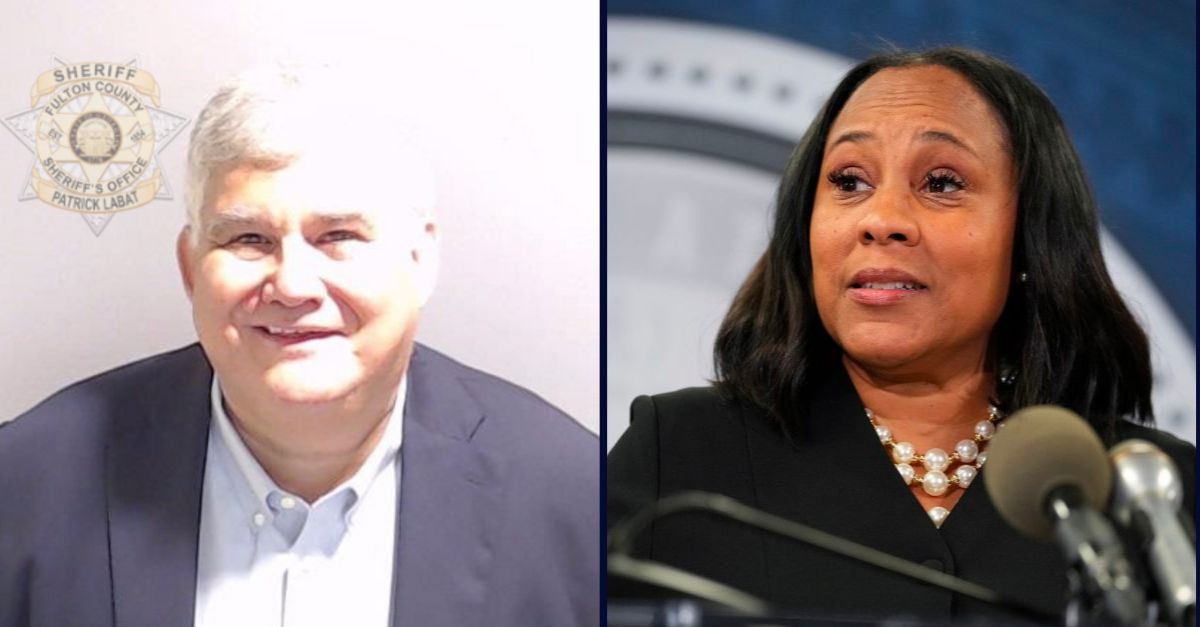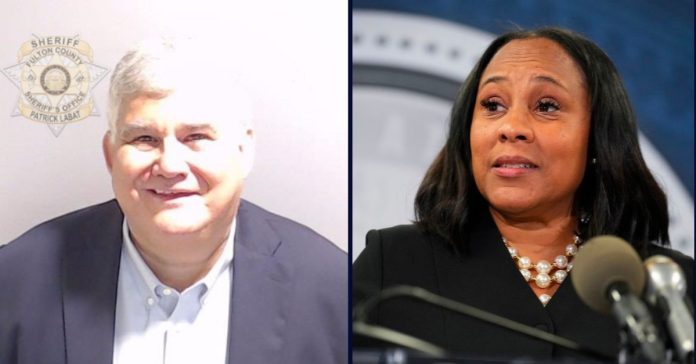
Left: Former Georgia GOP chair David Shafer in a booking photo (via Fulton County (Ga.) Sheriff’s Office). Right: FILE — Fulton County District Attorney Fani Willis speaks in the Fulton County Government Center during a news conference on Aug. 14, 2023, in Atlanta (AP Photo/John Bazemore, File).
The former Georgia GOP chair charged alongside former President Donald Trump in a sprawling racketeering case says that the Fulton County district attorney should be disqualified because of her personal relationship with one of the prosecutors and her public response to allegations of misconduct.
David Shafer was charged in August alongside Trump and more than a dozen other co-defendants with racketeering and election interference. According to the indictment, Shafer faces eight counts for RICO, impersonating a public officer, forgery in the first degree (two counts), false statements and writings (three counts), and criminal attempt to commit filing false documents. The indictment alleged that Shafer and co-defendants Shawn Still, a businessman and GOP politician, and Cathleen Latham, the former chair of the Coffee County Republican Party, impersonated a public officer by falsely casting themselves as legitimate presidential electors in writing, together forging a document purporting to be a “CERTIFICATE OF THE VOTES OF THE 2020 ELECTORS FROM GEORGIA.”
In a motion filed Monday, Shafer says that Willis, who recently acknowledged having a romantic relationship with special prosecutor Nathan Wade, who was hired by Willis’ office on a contract basis, should be removed from the case — along with her entire office. Wade’s estranged wife reportedly tried to subpoena Willis in connection with divorce proceedings.
The motion, which spans 229 pages including exhibits, says that Willis “has engaged in a pattern of prosecutorial, forensic misconduct which compels her disqualification from the prosecution of this case as well as the disqualification of her entire Office and prosecution staff.”
“All of the causes for the disqualification are self-inflicted blows,” the motion adds.
Like the motion from fellow Trump co-defendant Michael Roman, which similarly aimed at the relationship between Willis and lead prosecutor Nathan Wade, Shafer says that the DA’s “prejudicial” comments in January at Big Bethel A.M.E. Church in Atlanta amount to an attempt to bias future jury members.
In remarks at the church, Willis said that she was “confused” as to why Wade, who was one of three special prosecutors her office hired, was the only one facing public scrutiny.
“I appointed three special counsel, as is my right to do,” she said to parishioners. “Paid them all the same hourly rate. They only attack one. I hired one white woman, a good personal friend and great lawyer. A superstar, I tell you, I hired one white man, brilliant, my friend and a great lawyer. And I hired one Black man. Another superstar a great friend and a great lawyer. Oh, Lord, they’re going to be mad when I call them out on this nonsense. First thing they say. Oh, she going to play the race card now? But no. God, isn’t it them who’s playing the race card when they only question one?”
This, Shafer says, was an obvious attempt to affect a potential jury.
“Rather than properly addressing the accuracy of Mr. Roman’s allegations, the District Attorney chose a church setting to deflect the Roman allegations by making the most offensive and incendiary allegations against her accusers — forcing the defendants onto the lethal third rail of American politics, and in her own words, ‘playing the race card,”” the motion says. “The obvious intent of her remarks was to inject and infect the jury pool in Fulton County with unfounded allegations that anyone who dares question her or Mr. Wade’s conduct must have done so for racist purposes. As an attorney and, most importantly, a public prosecutor, her comments which directly affected the pending litigation were indefensible and reprehensible.”
Aside from Willis’ comments, the very act of hiring Wade “and paying him more than three times her annual salary while simultaneously receiving benefits and gifts from Mr. Wade, all while privately being involved in a romantic relationship with him, constitutes an actual, substantial conflict of interest for District Attorney Willis,” the motion says.
Shafer’s motion argues that if Willis is disqualified, then her entire office must also be blocked from the case, because, under Georgia precedent, “[a]ll other attorneys employed by a district attorney’s office ‘can perform no duties as such except those agreeable to and under the direction of the [district attorney].’”
Shafer wants an evidentiary hearing to delve into the relationship between Willis and Wade because “there are material facts which are in dispute,” specifically as to the timing of Wade’s hiring.
“The prosecution’s Opposition to the Roman Motion to Dismiss attaches a declaration by Mr. Wade wherein he swears that his personal relationship with District Attorney Willis began after his hiring in November of 2021 as a special assistant district attorney,” the motion says. “There is no declaration or affidavit from District Attorney Willis, however, the filing was filed in her name as District Attorney. Of course, she cannot file such a filing if she knows that it contains materially false statements. Mr. Roman’s reply filed on February 2, 2024, represents that several witnesses will directly refute Mr. Wade’s declaration. If the testimony of these witnesses proves credible, the inexorable conclusion would be that Mr. Wade has made false statements in his declaration which has been filed by the District Attorney or on her behalf in the record in this case, and which would constitute yet another instance of forensic misconduct by the District Attorney and her Office.”
Shafer acknowledges that an evidentiary hearing on Willis’ alleged misconduct and the details of her relationship with Wade is “unseemly and an uncomfortable experience for all involved,” and his attorneys do “not pursue these claims lightly.”
However, the motion says, Willis is responsible for the scrutiny she now faces.
“District Attorney Willis and Mr. Wade are not victims here — these are all self-inflicted and completely avoidable errors in which the defense had no hand, but are of such significance that the defense has no choice but to put them before the Court,” the motion says.
Willis has responded to prior requests to disqualify her “absurd” and show a “basic misunderstanding” of basic rules regarding disqualification.
Shafer also reportedly filed a motion to have the case moved out of Fulton County, arguing that the county’s voting history means he cannot get a fair trial. According to Atlanta ABC affiliate WSB, Shafer wants the case transferred to a county with fewer voting Democrats. Citing numbers from the 2020 election, Shafer says that Fulton County went 70% for Biden, while the two counties where he wants his case heard — Burke County and Peach County — voted almost equally for Trump and Biden.
Read Schaffer’s disqualification motion here.
Colin Kalmbacher contributed to this report.
Have a tip we should know? [email protected]

